#new zealand plant
Explore tagged Tumblr posts
Text
#2226 - Pseudopanax ferox - Toothed Lancewood

AKA fierce lancewood or horoeka.
And similar to the more common Pseudopanax crassifolius, that I covered for @purrdence's last visit, but with more prominently tooth-edged leaves. The juvenile leaves are narrow, a very dark grey-brown to grey-green colour, stiff and up to 40 cm long, and prominently toothed along the margins. This may have evolved to make them visibly and texturally unpalatable to Moa. After 10 to 15 years they transition to a much more normal-looking tree, now their foliage is out of reach to even the tallest giant flightless birds.

A mature toothed lancewood can be 6 metres tall with a trunk of 25 cm in diameter. The mature trunk has longitudinal grooves which sometimes twist slightly.
Increasingly popular as a small garden tree.
Other species of Pseudapanax are very different, as you'll see over coming weeks.
Craters of the Moon, Taupo Volcanic Zone, New Zealand
155 notes
·
View notes
Text

Karl Anderson via Unsplash
349 notes
·
View notes
Text
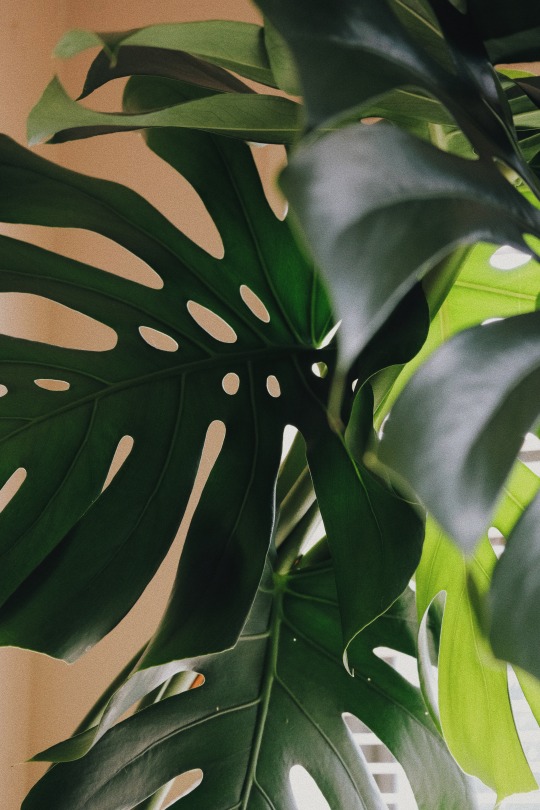
blaire snaps
#fujifilm#fuji#fujixseries#photography#new zealand#photographers of tumblr#plant#olive#light#monsterra
1K notes
·
View notes
Text
Dandelion News - November 22-28
Like these weekly compilations? Tip me at $kaybarr1735 or check out my Dandelion Doodles!
1. Los Angeles becomes a sanctuary city for LGBTQ+ youth and immigrants as officials reject Project 2025

“The Los Angeles City Council voted unanimously Tuesday to pass the “sanctuary city” ordinance, shielding queer youth who travel to the city to receive gender-affirming care from prosecution, as well as preventing city resources from being used in immigration enforcement[….]”
2. Huge deforested areas in the tropics could regenerate naturally, study finds

“Cleared or degraded tropical forests around the world covering a combined area larger than Saudi Arabia could regrow on its own, according to new research published Oct. 30 in the journal Nature. [… T]he permanence of regrown forests is critically important to the benefits it can provide to biodiversity and the climate.”
3. Minnesota tribe could soon get a solar-powered resilience hub

“A pair of developers are working to build a microgrid at an elementary school and community center on the White Earth Reservation in northern Minnesota [… which would] provide about 12 hours worth of backup power for residents to be able to charge cell phones, power medical equipment, or stay warm in the event of a power outage.”
4. An exchange between Indonesia and Tanzania supports food security and ocean health

“Around the world, WWF helps manage […] both traditional sustainability-oriented management and science-based practices. This combination supports long-term food security and biodiversity goals. […] Local ownership and management are […] key to achieving stable fisheries and social and economic benefits.”
5. Spiky blue devils and chocolate lilies: Victorian grassland bursts with wildflowers after ecological ‘reset’

“About 70 native plant species could be found within the site, including […] four endangered species of orchid. […] Careful management, including an ecological burn in May and weed control measures to reduce pasture grasses, laid the groundwork for wildflowers to thrive.”
6. Vast forests, wetlands and lakes conserved [in Ontario]

“A vast 970-hectare area featuring thriving forests, wetlands and crystal-clear lakes northeast of Sault Ste. Marie is now protected[….] The intact forests, lakes, wetlands and shorelines support high biodiversity and are home to many threatened species[….]”
7. A New Era of Compassion: How Suncoast Humane Society is Changing Animal Welfare for Good
“Our campus includes outdoor play areas, trails, and even a small swimming pool to encourage animals to stay active, explore, and simply be themselves.”
8. Building climate resilient cocoa farming in West Africa
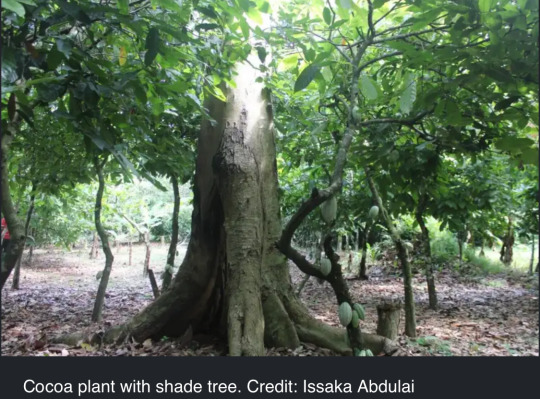
“[… A] promising new approach to improve climate resilience in cocoa agroforestry across West Africa […] focuses on the critical role of leaf "phenology"—the seasonal changes in leaf cycles—in trees providing shade in managing climate impacts. [… S]hade trees that lose their leaves entirely during the dry season proved especially beneficial in maintaining soil moisture[….]”
9. New Zealanders save more than 30 stranded whales by lifting them on sheets

“[The Department of Conservation] praised as “incredible” the efforts made by hundreds of people to help save the foundering pod. ���It’s amazing to witness the genuine care and compassion people have shown toward these magnificent animals[….]””
10. 'A really sobering moment:' English zoo fights extinction of freshwater Boxer pupfish

“Whipsnade Zoo aquarists were recently told by conservation partners that that the world's last remaining Boxer pupfish was in their care, prompting the zoo to carry out the immediate transport of all the "precious" Boxer pupfish eggs to another local conservation and education charity in the name of species preservation.”
November 15-21 news here | (all credit for images and written material can be found at the source linked; I don’t claim credit for anything but curating.)
#hopepunk#good news#los angeles#us politics#lgbt+#immigrants#deforestation#nature#minnesota#native american#indigenous#electricity#solar panels#solar energy#solar power#ocean#fishing#food insecurity#wildflowers#native wildflowers#native plants#conservation#canada#animal shelters#humane society#agroforestry#new zealand#whale#fish#endangered
126 notes
·
View notes
Text





Plant of the Day
Saturday 25 January 2025
This old hedge of Griselinia littoralis (New Zealand broadleaf) has had the lower branches removed exposing these characterful trunks. This crown lifting has allowed more space and light for the adjacent borders as the protection of the lowered evergreen foliage was no longer needed. This shrub or tree does best in a well-drained soil in full sun.
Jill Raggett
#Griselinia#New Zealand broadleaf#broadleaf#shrub#evergreen#trunks#crown lifting#tree pruning#arboriculture#plants#horticulture#gardens#garden#essex#foliage#hedge#RHS Hyde Hall#tree
53 notes
·
View notes
Text




you;re all so sexy
#yeah I’m bisexual#attracted to guys girls genderqueers and renewable energy sources#solarpunk#objectum#climate positivity#IM SO EXCITED FOR A FUTURE FULL OF RENEWABLE ENERGY!!!! I KNOW IT IS POSSIBLE!!!!!!!#in order left to right top to bottom: wind turbines solar panels hydroelectric dam and geothermal power plant#I LOVE GEOTHERMAL PLANTS#from new zealand aotearoa so I see a lot of them#THEY MAKE CLOUDS ^_^
381 notes
·
View notes
Text

Monarch butterfly caterpillars feed on a swan plant in Lincoln, New Zealand. The plant, a type of milkweed, is poisonous to nearly all other insects, but monarchs love it; they can smell its flowers from 2km away
Photograph: Sanka Vidanagama/NurPhoto/REX/Shutterstock
#sanka vidanagama#photographer#nurphoto#rex#shutterstock#monarch butterfly caterpillars#caterpillars#swan plant#lincoln#new zealand#nature#insect#macro photography
17 notes
·
View notes
Text
Viola filicaulis - Native violet, Melicytus (New Zealand, circa 1885) by Sarah Featon.
Watercolour.

Image and text information courtesy Museum of New Zealand Te Papa Tongarewa.
77 notes
·
View notes
Text


Mountain Snowberry | New Zealand, Earth's Mythical Islands: Wild Extremes
#documentaryedit#natureedit#flowers#plants#Mountain Snowberry#Alpine Wax Berry#Gaultheria depressa#🌱#gifs#PFA orig#src documentary#📺 New Zealand: Earth's Mythical Islands (2016)#narrated by Sam Neill#(shadow is a Wētā feeding off the plant)
34 notes
·
View notes
Text
Tbh, i think JRR Tolkien would've really loved New Zealand. Just watching the movies, seeing these beautiful sprawling landscapes and diverse ecosystems, and being aware of Tolkien's absolute adoration for all things natural. Idk I think if he ever saw the locations where the filming took place, he'd be like "oh fuck yeah"
#devon talks#lord of the rings#lotr#jrr tolkien#new zealand#lol im high and just had this thought. i could watch the backgrounds for ages#i know a lot of it is cgi or set design#but the landscapes are probably my favorites :)#i wouldve loved to talk about plants with him
20 notes
·
View notes
Text
#2369 - Polytrichum commune - Common Haircap Moss


AKA great golden maidenhair, and great goldilocks.
Common Haircap is common throughout temperate and boreal latitudes in the Northern Hemisphere, Mexico, Australia, and several Pacific Islands including New Zealand.
A species of large moss growing in damp acidic areas, including in open areas disturbed by human activitoes and livestock. The stems can be 70 cm, which it manages by have tissues specialised to transport water. That's the standard for the 'higher', vascular plants - practically the defining feature, in fact - but is extremely unusual for mosses.
The genus also have parallel lamellae on the upper surfaces of the leaves, with rows of photosynthetic tissue capped with large cells that trap moist air between them but still alow gas exchange. Most mosses have a simple plate of photosynthetic tissue. If conditions become too dry the leaves will twist around the stem.
Pohokura, North Island, New Zealand
121 notes
·
View notes
Text

Katelyn Greer via Unsplash
45 notes
·
View notes
Text
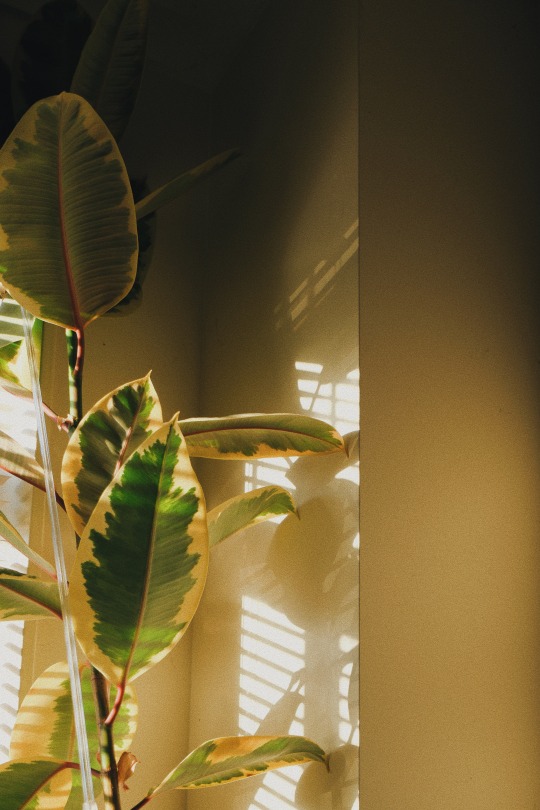
blaire snaps
1K notes
·
View notes
Text
And now for something completely different. (Not my video!) My friend @toooldforthissh--stuff is in New Zealand and just sent me this. *star eyes emoji*
235 notes
·
View notes
Text
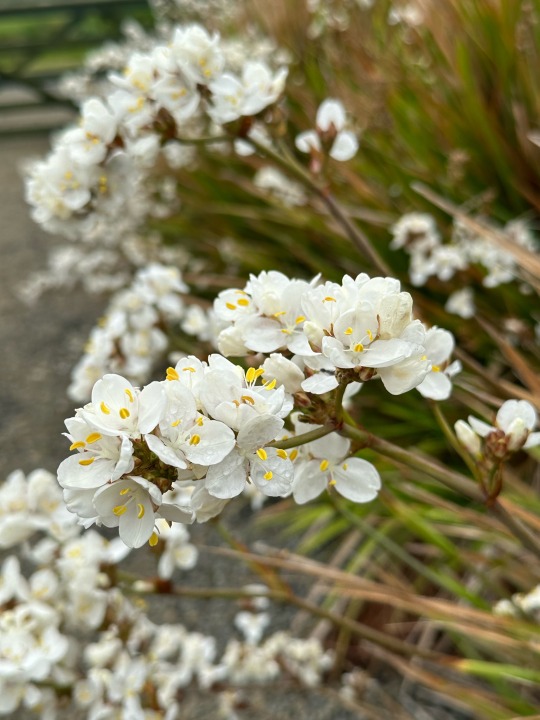
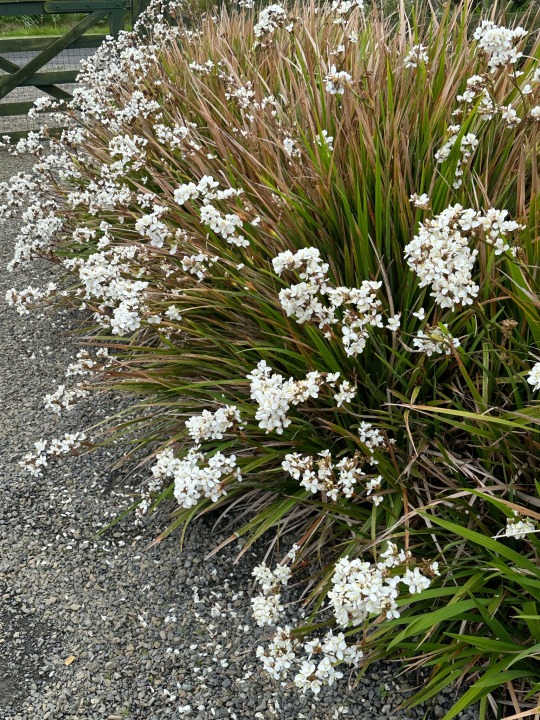
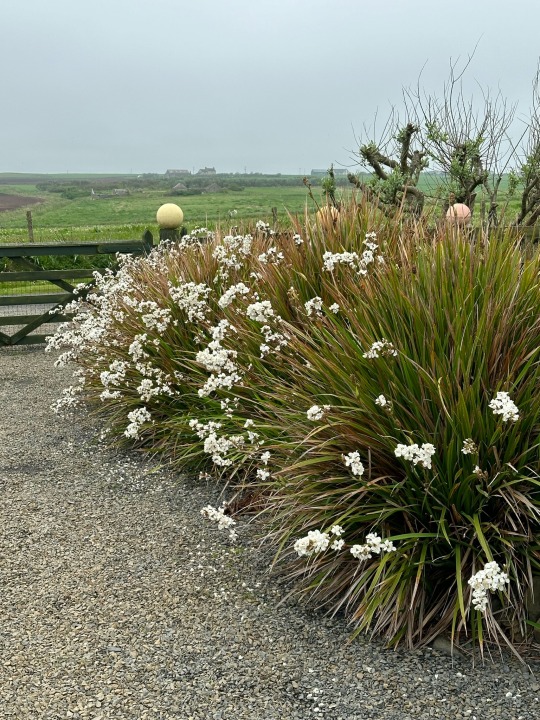
Plant of the Day
Sunday 26 May 2024
In my friend’s lovely garden she has created an informal hedge with Libertia grandiflora (New Zealand satin flower). Strong-growing, evergreen clumps of leaves line the entrance and now are covered with white, bowl-shaped flowers. In the autumn the flowers are followed by round seed pods which turn black when they mature.
Jill Raggett
#Libertia#New Zealand satin flower#white flowers#plants#horticulture#gardens#garden#informal hedge#herbaceousperennial#herbaceous#evergreen#orkney#front garden
125 notes
·
View notes
